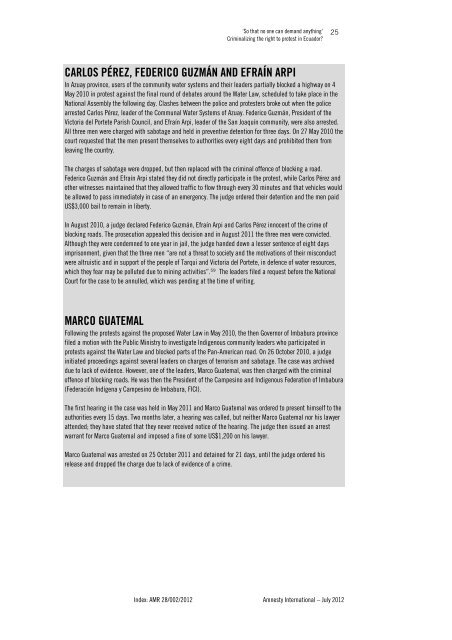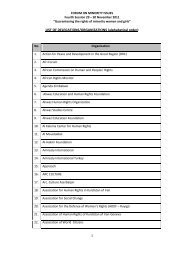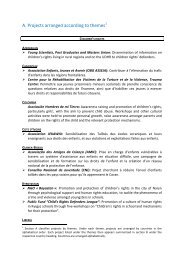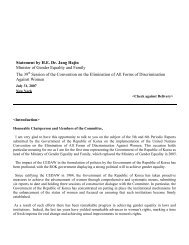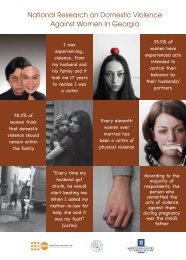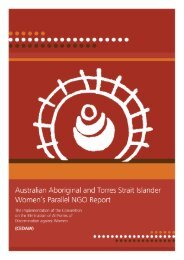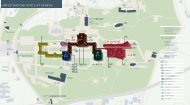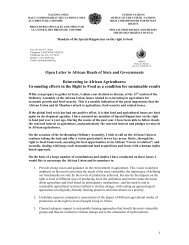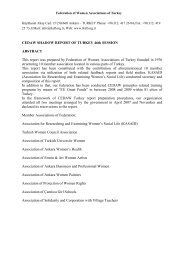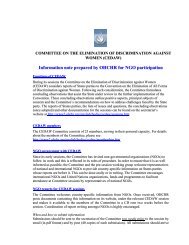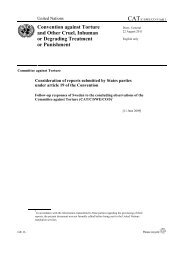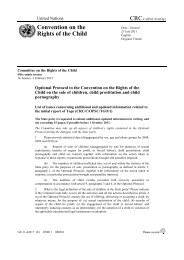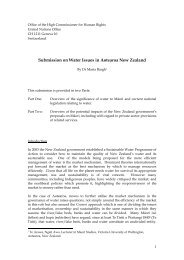'SO THAT NO ONE CAN DEMAND ANYTHING' - Office of the High ...
'SO THAT NO ONE CAN DEMAND ANYTHING' - Office of the High ...
'SO THAT NO ONE CAN DEMAND ANYTHING' - Office of the High ...
Create successful ePaper yourself
Turn your PDF publications into a flip-book with our unique Google optimized e-Paper software.
‘So that no one can demand anything’Criminalizing <strong>the</strong> right to protest in Ecuador?25CARLOS PÉREZ, FEDERICO GUZMÁN AND EFRAÍN ARPIIn Azuay province, users <strong>of</strong> <strong>the</strong> community water systems and <strong>the</strong>ir leaders partially blocked a highway on 4May 2010 in protest against <strong>the</strong> final round <strong>of</strong> debates around <strong>the</strong> Water Law, scheduled to take place in <strong>the</strong>National Assembly <strong>the</strong> following day. Clashes between <strong>the</strong> police and protesters broke out when <strong>the</strong> policearrested Carlos Pérez, leader <strong>of</strong> <strong>the</strong> Communal Water Systems <strong>of</strong> Azuay. Federico Guzmán, President <strong>of</strong> <strong>the</strong>Victoria del Portete Parish Council, and Efraín Arpi, leader <strong>of</strong> <strong>the</strong> San Joaquín community, were also arrested.All three men were charged with sabotage and held in preventive detention for three days. On 27 May 2010 <strong>the</strong>court requested that <strong>the</strong> men present <strong>the</strong>mselves to authorities every eight days and prohibited <strong>the</strong>m fromleaving <strong>the</strong> country.The charges <strong>of</strong> sabotage were dropped, but <strong>the</strong>n replaced with <strong>the</strong> criminal <strong>of</strong>fence <strong>of</strong> blocking a road.Federico Guzmán and Efraín Arpi stated <strong>the</strong>y did not directly participate in <strong>the</strong> protest, while Carlos Pérez ando<strong>the</strong>r witnesses maintained that <strong>the</strong>y allowed traffic to flow through every 30 minutes and that vehicles wouldbe allowed to pass immediately in case <strong>of</strong> an emergency. The judge ordered <strong>the</strong>ir detention and <strong>the</strong> men paidUS$3,000 bail to remain in liberty.In August 2010, a judge declared Federico Guzmán, Efraín Arpi and Carlos Pérez innocent <strong>of</strong> <strong>the</strong> crime <strong>of</strong>blocking roads. The prosecution appealed this decision and in August 2011 <strong>the</strong> three men were convicted.Although <strong>the</strong>y were condemned to one year in jail, <strong>the</strong> judge handed down a lesser sentence <strong>of</strong> eight daysimprisonment, given that <strong>the</strong> three men “are not a threat to society and <strong>the</strong> motivations <strong>of</strong> <strong>the</strong>ir misconductwere altruistic and in support <strong>of</strong> <strong>the</strong> people <strong>of</strong> Tarqui and Victoria del Portete, in defence <strong>of</strong> water resources,which <strong>the</strong>y fear may be polluted due to mining activities”. 59 The leaders filed a request before <strong>the</strong> NationalCourt for <strong>the</strong> case to be annulled, which was pending at <strong>the</strong> time <strong>of</strong> writing.MARCO GUATEMALFollowing <strong>the</strong> protests against <strong>the</strong> proposed Water Law in May 2010, <strong>the</strong> <strong>the</strong>n Governor <strong>of</strong> Imbabura provincefiled a motion with <strong>the</strong> Public Ministry to investigate Indigenous community leaders who participated inprotests against <strong>the</strong> Water Law and blocked parts <strong>of</strong> <strong>the</strong> Pan-American road. On 26 October 2010, a judgeinitiated proceedings against several leaders on charges <strong>of</strong> terrorism and sabotage. The case was archiveddue to lack <strong>of</strong> evidence. However, one <strong>of</strong> <strong>the</strong> leaders, Marco Guatemal, was <strong>the</strong>n charged with <strong>the</strong> criminal<strong>of</strong>fence <strong>of</strong> blocking roads. He was <strong>the</strong>n <strong>the</strong> President <strong>of</strong> <strong>the</strong> Campesino and Indigenous Federation <strong>of</strong> Imbabura(Federación Indígena y Campesino de Imbabura, FICI).The first hearing in <strong>the</strong> case was held in May 2011 and Marco Guatemal was ordered to present himself to <strong>the</strong>authorities every 15 days. Two months later, a hearing was called, but nei<strong>the</strong>r Marco Guatemal nor his lawyerattended; <strong>the</strong>y have stated that <strong>the</strong>y never received notice <strong>of</strong> <strong>the</strong> hearing. The judge <strong>the</strong>n issued an arrestwarrant for Marco Guatemal and imposed a fine <strong>of</strong> some US$1,200 on his lawyer.Marco Guatemal was arrested on 25 October 2011 and detained for 21 days, until <strong>the</strong> judge ordered hisrelease and dropped <strong>the</strong> charge due to lack <strong>of</strong> evidence <strong>of</strong> a crime.Index: AMR 28/002/2012 Amnesty International – July 2012


